I’ve been limping through a book by a NYT bestselling writer for about three months now. Obviously I’m not enthralled, so why am I still reading it? Because I like to be familiar with the various well-known thriller and mystery novelists out there, and that means reading at least one of their works.
There is much to like about this book. The author—I’ll call him “h”—has a breezy, conversational style that makes for a fast, engaging read. On the other hand, his style is so conversational that he frequently skips back and forth between past and present tense—even in the same paragraph—which repeatedly jerks me out of the story and drives me nuts.
But what has really turned me off on this writer is the fact that his hero sneers at everyone around him. The book is told entirely from the hero’s point of view, and no one—not his dead wife, not his mother, not his sister, not his best friend, not his father-in-law—no one is portrayed as an attractive, sympathetic person except for our hero. He sneers at everyone.
I was commenting on this to my Monday night writers group, and Sphinx Ink—who has a far better memory than I do—said, “I remember you complaining about another writer for the same thing.” I said, “I did?”
So I did. That book—by a former romance writer turned thriller writer whom I’ll call “t”—featured a female protagonist who also sneered at all around her. It was a big book with a huge cast, and the only person our heroine portrayed kindly was an eight-year-old kid—and maybe a horse. I mention the horse because there were two dogs and a cat in the story, and they were also portrayed as unpleasant beings.
So what’s going on here? As writers, we’re frequently told to create a “sympathetic” protagonist—someone our readers will “like.” Personally, I don’t like people who sneer at everyone else, but since these writers are on the NYT bestseller list, I’m obviously alone in finding their work offensive.
Another member of our group, Charles Gramlich, who in addition to being a horror and fantasy writer is also a psychologist, said he thought a lot of people actually enjoy seeing other people put down—that this is a big part of the appeal of Reality TV and shows like Candid Camera and Survivor. What do you think?
Thursday, February 28, 2008
Wednesday, February 27, 2008
Leapin’ Leap Year, Batman!
You know you’re pathetically far behind in your writing schedule when the realization that this is a leap year brings a little zing of joy.
I was hoping to make it to page 200 of my current opus, THE DEADLIGHT CONNECTION, by the end of February. Ain’t gonna happen. But… BUT! The month does not end on Thursday, February 28th; it ends on Friday, the 29th. Which means I have an entire extra day to get that little bit closer to my goal.
Thank you, oh ye leap year gods.
I was hoping to make it to page 200 of my current opus, THE DEADLIGHT CONNECTION, by the end of February. Ain’t gonna happen. But… BUT! The month does not end on Thursday, February 28th; it ends on Friday, the 29th. Which means I have an entire extra day to get that little bit closer to my goal.
Thank you, oh ye leap year gods.
Monday, February 25, 2008
When Life's a Beach
My daughter’s college had their Parents Weekend this past weekend, so Steve and I endured the hardship of flying down to Florida, listening to Calypso music, eating key lime pie and sailing around the bay.

Steve spent his college years in Oklahoma, watching Texas blow north and Kansas blow south. I went to school in Northern Idaho, trudging through endless freezing blizzards. Danielle, on the other hand, got a scholarship to go to the beach.

My daughter is way smarter than either of us.

Steve spent his college years in Oklahoma, watching Texas blow north and Kansas blow south. I went to school in Northern Idaho, trudging through endless freezing blizzards. Danielle, on the other hand, got a scholarship to go to the beach.

My daughter is way smarter than either of us.
Saturday, February 16, 2008
Gone Writing
As I've slipped further and further behind in my schedule, I'm off to the lake for a few days' intensive writing. See y'all next week.
Thursday, February 14, 2008
On Abandoning a Book Unfinished.
My Monday night writers group has coined a word to describe the act of abandoning a book unfinished: proctorizing. Obviously, this is something I do frequently—far more than anyone else in the group—although I’ve noticed they do it more and more these days. They’ll come in and say, “I started So-and-so’s latest, but I proctorized it after about a hundred pages,” and then go on to analyze why.
There was a time when I religiously finished every book I started, even if I wasn’t enjoying it. When I was a child, I knew I liked some books better than others, but I never analyzed why. I had this naive belief that if a book was published, then it was somehow anointed as worthy of being read.
As I grew, I came to understand the differences between popular fiction and the classics, but I still finished every book I began. At some point, one of my teachers handed out a list entitled One Hundred Novels Every Educated Person Should Have Read. I don’t know who compiled that list, but I was determined to be labeled an Educated Person. As I grimly plowed through one after the other of the books on that list, year after year, I experienced some wonderful books I probably never would have read otherwise. I also encountered some real stinkers. But when I found my attention wandering, I naturally attributed it to a failing on my part. After all, who was I to say Fitzgerald sucks?
It wasn’t until I was in college and began reading more modern popular fiction that I finally realized that yes, really awful books get published—and hit the bestseller lists—all the time. Just because some idiot editor let this tripe into print didn’t mean I had to waste my precious reading time finishing it.
Sometimes I put a book aside and go back to it later, thinking a change of mood might improve my reception of the story. At other times I can appreciate a book’s merit, but realize that for one reason or another it’s not for me. But frequently I abandon books in something close to a rage because the author has really, really annoyed me. For the sake of market research, I will at times try to continue those books for a while, hoping to understand what it is about a particular bestseller that explains its appeal. I’ve come to realize that clunky writing, silly factual errors, gaping plot holes, thin characters, predictable or implausible situations don’t seem to bother most people.
We all read for our own reasons, and find pleasure in our own combination of factors. But with so many books out there to read, and the time for reading them shrinking every day, I find myself less and less willing to tolerate a book that fails to sweep me away in that magical way I first came to love as a child. Which is why I proctorize so many books.
There was a time when I religiously finished every book I started, even if I wasn’t enjoying it. When I was a child, I knew I liked some books better than others, but I never analyzed why. I had this naive belief that if a book was published, then it was somehow anointed as worthy of being read.
As I grew, I came to understand the differences between popular fiction and the classics, but I still finished every book I began. At some point, one of my teachers handed out a list entitled One Hundred Novels Every Educated Person Should Have Read. I don’t know who compiled that list, but I was determined to be labeled an Educated Person. As I grimly plowed through one after the other of the books on that list, year after year, I experienced some wonderful books I probably never would have read otherwise. I also encountered some real stinkers. But when I found my attention wandering, I naturally attributed it to a failing on my part. After all, who was I to say Fitzgerald sucks?
It wasn’t until I was in college and began reading more modern popular fiction that I finally realized that yes, really awful books get published—and hit the bestseller lists—all the time. Just because some idiot editor let this tripe into print didn’t mean I had to waste my precious reading time finishing it.
Sometimes I put a book aside and go back to it later, thinking a change of mood might improve my reception of the story. At other times I can appreciate a book’s merit, but realize that for one reason or another it’s not for me. But frequently I abandon books in something close to a rage because the author has really, really annoyed me. For the sake of market research, I will at times try to continue those books for a while, hoping to understand what it is about a particular bestseller that explains its appeal. I’ve come to realize that clunky writing, silly factual errors, gaping plot holes, thin characters, predictable or implausible situations don’t seem to bother most people.
We all read for our own reasons, and find pleasure in our own combination of factors. But with so many books out there to read, and the time for reading them shrinking every day, I find myself less and less willing to tolerate a book that fails to sweep me away in that magical way I first came to love as a child. Which is why I proctorize so many books.
Monday, February 11, 2008
The Hundred-Page Hiccup
I’ve been at this writing business long enough that I’ve begun to notice a pattern. Not in every book, but in enough of them that I’ve learned not to panic (too much), somewhere around about page 75 to 100 I find I frequently start getting uncomfortable with the way a manuscript is progressing. If I were a pantser I guess I’d just charge ahead and finish the book, figuring I’ll go back and fix it on my second pass. But because I have this thing about control, I can’t do that. I also have this fear that what’s wrong may be so fundamental that I need to fix it now before I get irretrievably headed off down the wrong path.
So I go back and reread. And fret. And reread. And struggle to figure out why things just don’t “feel” right. Eventually, I have a eureka moment and I realize out what’s wrong.
Sometimes it’s a plot problem. Sometimes it’s a problem with character development. In the book I’m working on right now—my second thriller, THE DEADLIGHT CONNECTION—I knew that for a three to four chapter stretch, the book was going flat. Why? It wasn’t a plot problem—those scenes were pivotal. So why did that section feel off? I finally realized that in that section I was forgetting to make my scene questions clear. I was also failing to add the necessary depth to my character’s experience.
Now that I know what the problem is, I’ll go back and rework. Only then will I be able to move forward again. Until I hit the next hiccup.
So I go back and reread. And fret. And reread. And struggle to figure out why things just don’t “feel” right. Eventually, I have a eureka moment and I realize out what’s wrong.
Sometimes it’s a plot problem. Sometimes it’s a problem with character development. In the book I’m working on right now—my second thriller, THE DEADLIGHT CONNECTION—I knew that for a three to four chapter stretch, the book was going flat. Why? It wasn’t a plot problem—those scenes were pivotal. So why did that section feel off? I finally realized that in that section I was forgetting to make my scene questions clear. I was also failing to add the necessary depth to my character’s experience.
Now that I know what the problem is, I’ll go back and rework. Only then will I be able to move forward again. Until I hit the next hiccup.
Thursday, February 07, 2008
Cardiopulmonary Reality
You know the tendency some authors have toward filling their thrillers and romances with pounding hearts and quickened breathing? I once heard a great expression for it: cardiopulmonary hyperbole (I wish I could acknowledge where I got this gem, but I’ve forgotten). It’s an easy trap to fall into because, how else do you describe the human reaction to fear?
Last night, I was stopped at a red light at the corner of Vets and Transcontinental here in Metairie when I saw a blue minivan come barreling up behind me, swerve into the turning lane, and shoot on out into the intersection. In the slow motion way these things happen, I had time to think, “That idiot is going to run the red light,” and, “Oh my god this guy’s going to get hit,” before a car going about 45 mph slammed into him. The impact flipped the minivan and sent it airborne. As I sat there watching this upside down minivan flying through the air toward me (and my shiny new red car), my thoughts naturally turned to, “Eeek, this guy could come down right on top of me!” and “There’s a car behind me, I can’t back up.” Then the minivan crashed down on its roof a few feet in front me and skidded to a halt beside me.
Without the least danger of falling into hyperbole or exaggeration, I can quite accurately say that my breath was coming hard and fast. I punched on my emergency flashers and watched incredulously as the guy behind me calmly pulled out into the turning lane, passed me, and continued on through the intersection when the light turned green. No cardiopulmonary excesses there, obviously. Everyone else in the vicinity was spilling out of their cars, yanking out their cell phones (of course I didn’t have mine), and screaming, “Oh, my God! Oh, my God!”
Writers are sick people. Yes, I was horrified by what I had just seen happen to the occupants of that minivan, and humbled by what almost happened to me. But a part of my brain was also thinking, “Hmm. My heart actually isn’t pounding all that hard, but I am seriously hyperventilating. What other physical symptoms of shock and horror am I experiencing? How would I describe them?”
The problem is, of course, that these are the standard human reactions to fear and shock—pounding heart, rapid breathing—and there are only so many ways to describe those physical manifestations. The secondary reactions set in a few minutes later—the shaking and (for those of us with a tendency to cry) the tears.
So how do writers of books filled with shootings, explosions, chases, etc, avoid falling into cardiopulmonary hyperbole while still giving readers a realistic description of the effect of these incidents on their characters?
Last night, I was stopped at a red light at the corner of Vets and Transcontinental here in Metairie when I saw a blue minivan come barreling up behind me, swerve into the turning lane, and shoot on out into the intersection. In the slow motion way these things happen, I had time to think, “That idiot is going to run the red light,” and, “Oh my god this guy’s going to get hit,” before a car going about 45 mph slammed into him. The impact flipped the minivan and sent it airborne. As I sat there watching this upside down minivan flying through the air toward me (and my shiny new red car), my thoughts naturally turned to, “Eeek, this guy could come down right on top of me!” and “There’s a car behind me, I can’t back up.” Then the minivan crashed down on its roof a few feet in front me and skidded to a halt beside me.
Without the least danger of falling into hyperbole or exaggeration, I can quite accurately say that my breath was coming hard and fast. I punched on my emergency flashers and watched incredulously as the guy behind me calmly pulled out into the turning lane, passed me, and continued on through the intersection when the light turned green. No cardiopulmonary excesses there, obviously. Everyone else in the vicinity was spilling out of their cars, yanking out their cell phones (of course I didn’t have mine), and screaming, “Oh, my God! Oh, my God!”
Writers are sick people. Yes, I was horrified by what I had just seen happen to the occupants of that minivan, and humbled by what almost happened to me. But a part of my brain was also thinking, “Hmm. My heart actually isn’t pounding all that hard, but I am seriously hyperventilating. What other physical symptoms of shock and horror am I experiencing? How would I describe them?”
The problem is, of course, that these are the standard human reactions to fear and shock—pounding heart, rapid breathing—and there are only so many ways to describe those physical manifestations. The secondary reactions set in a few minutes later—the shaking and (for those of us with a tendency to cry) the tears.
So how do writers of books filled with shootings, explosions, chases, etc, avoid falling into cardiopulmonary hyperbole while still giving readers a realistic description of the effect of these incidents on their characters?
Tuesday, February 05, 2008
Courir de Mardi Gras
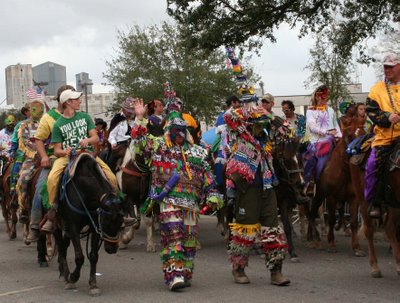
This is Mardi Gras Cajun style. It’s a scene enacted all over Acadia, but this year we decided to attend the Courir de Mardi Gras in the little town of Eunice, about 150 miles west of New Orleans.

The Cajuns, as everyone knows, are descendents of peasants from the west of France who originally settled “Acadia” in Canada in the 17th century. When the British conquered their part of Canada in the early 18th, the French settlers were subjected to a ruthless “ethnic cleansing.” Some of the survivors eventually made it to Louisiana, where they still form a recognizable group and still speak French (or at least, their own version of French). Many of the Cajuns settled in the swamps and bayous, but there are also “prairie Cajuns” who raise cattle and rice.
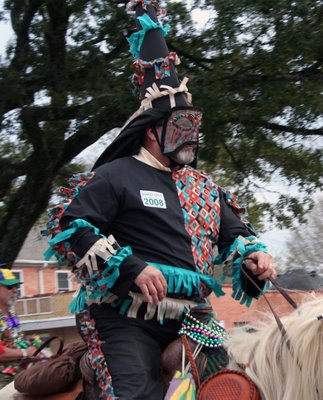
So what exactly is going on here? Well, every Mardi Gras morning, the participants in the traditional Courir de Mardi Gras dress in costumes, mask, and set out on horseback (and on wagon beds—an important component, since the wagons hold the beer and the portapotties). Ranging over the countryside, they sing, dance, and beg at each house until the owners offer them some of the ingredients for gumbo. Since one of the ingredients is chicken, this frequently involves live chickens being tossed into the air. The revelers—usually in increasing stages of intoxication—chase the chickens in a free-for-all that has been likened to (drunk) football players trying to recover a fumble.
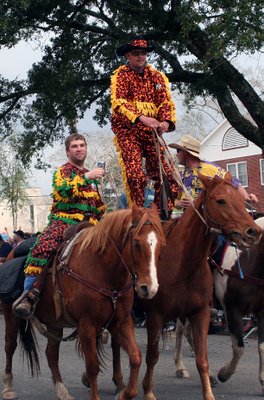
The costume is traditional. The capuchons or conical hats date back to the Middle Ages and are meant to mock the headdresses of medieval noblewomen. The fringes and patches also hark back to the days of tattered poverty.
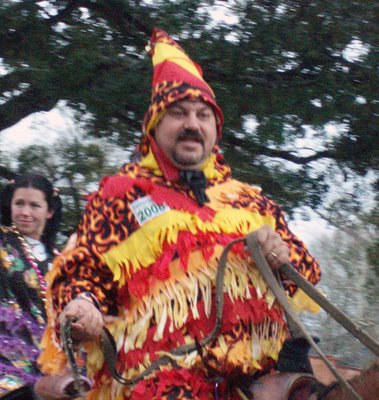
While the Courir participants are out chasing chickens and sausages, the people left in town wander around an arts and crafts fair, listen to live Cajun and Zydeco bands, and dance in the streets. By late afternoon, the Courir returns and parades down Main Street. We’re talking hundreds of riders, dancing on their horses, riding backwards, covered in mud from chasing chickens through crawfish ponds, and still drinking beer. At the end of it all, the chickens, onions, tomatoes, etc, they’ve collected are used to prepare a great communal meal of gumbo.
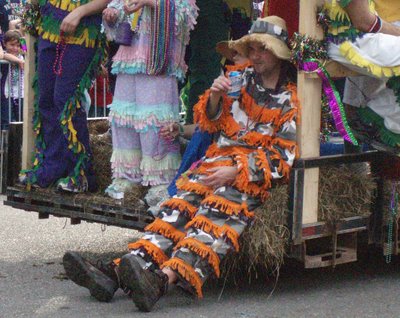
I’ve always wanted to experience the Courir de Mardi Gras, but we actually ended up spending this year’s Mardi Gras in Eunice thanks to a bit of serendipity. A couple of weeks ago an email appeared in my mailbox entitled “Long lost cousin?” You see, genealogy is one of my passions, and I’ve been in touch with a couple in Germany (with access to incredibly well-preserved church records) who have a huge site dedicated to tracing one part of my mother’s family back so far it’s scary. Well, it turns out that “Ed” is my third cousin once removed. A branch of my great-grandfather’s family traveled up the river to Acadia and settled in the Eunice, Mowata, and Roberts Cove area at the end of the nineteenth century. Their descendents have interbred with the Cajuns, so although I don’t have a drop of Cajun in me personally, a lot of these inebriated revelers are my distant cousins.

Which is how I ended up spending the day watching a bunch of drunks on horseback chase chickens.
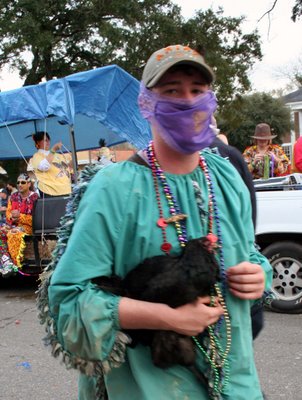
Happy Mardi Gras everybody!
Sunday, February 03, 2008
Laissez les Bons Temps Rouler

Smell the spicy scent of jambalaya drifting on a warm Southern breeze. Feel the beat of the marching band. Hear the roar of the crowd, shouting “Throw me somethin’, Mister!” You gotta love this town.

St. Augustine’s Marching One Hundred, strutting proud again. Ever since Katrina, I can’t see these guys without getting all choked up.

A knight from…I forget.
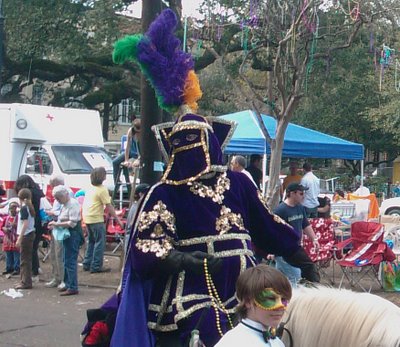
Unfortunately I’m also really good at forgetting my camera, so these were snapped with a phone. Maybe next time...
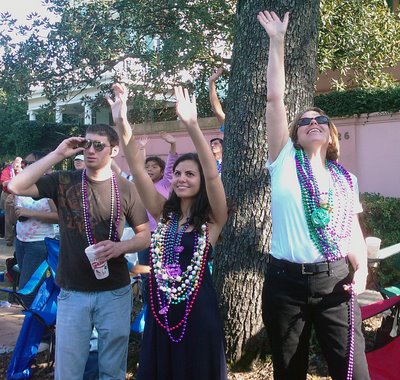
Subscribe to:
Posts (Atom)



